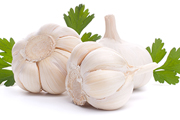Meet Health Superstar - Garlic/Allicin
Garlic, used for culinary and medicinal purposes by many cultures for centuries, belongs to the Allium (Onion) family. The entire “head” is called a bulb and each segment a clove. Most of the health effects of garlic are caused by one of the organosulfur compounds, allicin. Kept in separate compartments of the garlic cells, two key compounds, alliinase and alliin work together to form allicin. Alliin and alliinase only combine once these compartments rupture. When fresh garlic is chopped or crushed, the enzyme alliinase converts alliin into allicin, the constituent responsible for the aroma of fresh garlic. However, the instability of the generated allicin generated quickly changes into a series of other sulfur containing compounds. Processing garlic by chopping, crushing, mincing into a paste or cooking rapidly decreases its allicin activity.
 How to Choose a Good Garlic Supplement?
How to Choose a Good Garlic Supplement?
When taking garlic supplements, it is important to ensure that the product provides a sufficient supply of allicin. For example, if you are taking dried garlic powder, aged garlic extract or distilled garlic oil, these products contain negligible amounts of allicin. The impotence of these products occurs because once alliinase interacts with alliin; it diminishes, completely disappearing in 48 hours making the level of allicin absorbed into your body essentially zero. So before buying a garlic supplement, make sure the label lists its allicin concentration, and not just garlic powder as an ingredient. New Health Garlic Guard uses a patented process to separate alliinase and alliin, so alliinase only converts alliin to allicin when the capsule dissolves in the digestive tract ensuring a high bioavailability of allicin.
 Health Benefits of Allicin
Health Benefits of Allicin
Allicin provides a wide range of health benefits. It exhibits antibacterial, antifungal, antiviral activity, and other additional potent biological effects described below:
● Reduces Blood Pressure:
Cardiovascular diseases such as heart attacks and strokes are the world’s biggest killers. High blood pressure is one of the most important drivers of these diseases. Human studies found allicin has a significant impact on reducing high blood pressure. Allicin can reduce blood pressure by causing smooth muscle relaxation and vasodilation (widening of blood vessels) in the blood vessel wall by activating the production of endothelium-derived relaxation factor.
● Improves Cholesterol Levels:
Allicin can lower total and LDL cholesterol by inhibiting the enzymes for cholesterol synthesis. For those with high cholesterol, allicin appears to reduce total and/or LDL cholesterol by 10 to 15%. Garlic is also believed to reduce oxidative stress and LDL oxidation to produce its anti-thrombotic effects.
● Powerful Antioxidant activity:
Oxidative damage from free radicals contributes to the ageing process. Garlic contains antioxidants that support the body’s protective mechanisms against oxidative damage. Research shows that organosulfur compounds in garlic can stimulate our antioxidant enzymes, such as glutathione, an important intracellular antioxidant, to reduce oxidative stress especially in those with hypertension or hyperlipidemia.
The combined effects of reducing cholesterol, blood pressure, and its powerful antioxidant properties, also makes allicin a candidate to help prevent common brain diseases like Alzheimer’s disease and dementia.
● Detoxify Heavy Metals in the Body:
At high doses, the sulfur compounds in garlic protect against organ damage from heavy metal toxicity. A four week study at a car battery plant (excessive lead-exposure) found that garlic reduced worker lead levels in the blood by 19%. It also reduced many clinical signs of toxicity, including headaches and blood pressure.
● Restores Suppressed Antibody Responses:
Garlic may stimulate both humoral and cellular immunity, causing T-cell proliferation and thus restoring a suppressed antibody response. Allicin is also believed to stimulate macrophage cytotoxicity on tumor cells.
● Cancer Prevention:
Unregulated cell division and resistance to signals that induce apoptosis are hallmarks of human cancers. In normal cells, the cell cycle is tightly regulated to ensure correct DNA replication and cell division. Following DNA damage, the cell cycle can be halted to allow for DNA repair or activation of apoptosis. Allicin has been found to induce cell cycle arrest and apoptosis in cancer, cell line and animal model studies.



